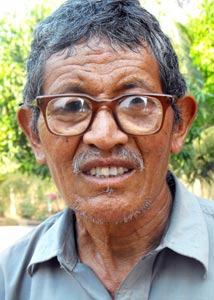Name: Palden Chonphel
(Alias: No)
Gender: Male
Interview Age: 71
Date of Birth: 1939
Birthplace: Khalung, Utsang, Tibet
Year Left Tibet: 1959
Profession: Dairy Farming, Farming, Trade
Monk/Nun: No
Political Prisoner: No

Interview No.: 49M
Date: 2010-04-07
Language: Tibetan
Location: Doeguling Settlement, Mundgod, Karnataka, India
Categories: Culture and History
Keywords: childhood memories, customs/traditions, escape experiences, farm life, festivals, forced labor, herding, salt trade, shamans/mediums, songs/opera, trade, Utsang
Summary:
Palden Chonphel's family consisted of nine members. They were farmers called samadok, who cultivated grains as well as reared animals. The family owned about 300 yaks and over 1,000 goats and sheep. Besides these two occupations, his father was engaged in salt trade. He fondly describes how his family and others traveled far north to buy salt and bartered for grains.
Palden Chonphel gives a rendition of songs sung on various occasions such as the milking and harvesting and songs about religion and love. He gives a description of a strange and unique custom followed in his village, which banned the entry of women, monks and yaks in the later half of the day after the crops were sown. It was believed that their entering the village would bring about hailstorms which would destroy the crops. He describes in great detail the ngagpa 'shaman' who possesses the power to ward off hailstorms with his magical instrument and mantra.
Palden Chonphel escaped from Tibet in 1959 with almost his entire village after the Chinese began conscripting villagers to construct roads nearby.
Interview Team:
- Rebecca Novick (Interviewer)
- Ronny Novick (Videographer)
- Namgyal Tsering (Interpreter)

